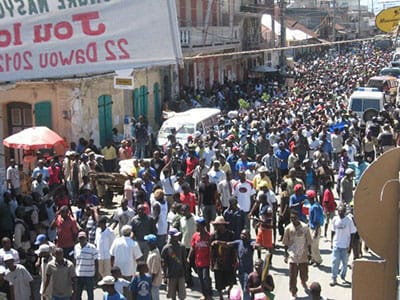by Kevin Pina
Friday, Sept. 21, saw yet another in a series of large demonstrations across Haiti. The largest protests were registered in Cap Haitien and La Cayes, Haiti’s second and third largest cities, against what many protestors called “the corruption of the Martelly regime.”

On the same day, the new U.S. ambassador to Haiti, Pamela A. White, inaugurated her new personal Twitter account @AmbPWhite. As news of the protests against Martelly began to spread throughout Haiti, Ambassador White tweeted her disapproval: “These demonstrations are SO unfortunate. Burning tires will not change a thing. They will turn off international business interests.”

That she seems to either be unaware or disingenuous about the increasing evidence of growing corruption in the current Haitian government and the commiserate misery and hunger facing Haitians was crystal clear.

More interesting was that not a single U.S. news outlet filed a story in English on the demonstrations. Most conspicuously absent in their coverage was The Miami Herald, whose Caribbean correspondent, Jacqueline Charles, was busy tweeting about Haitian news of the protests throughout the morning despite claiming to be on vacation.

Unfortunately, Charles’ “comprehensive reporting” did not include a single word written for The Miami Herald about the protests against Martelly rocking Haiti. Not a word published despite her clear knowledge of events, including tweeting a picture of Martelly and the Right Honorable Michaëlle Jean, UNESCO special envoy for Haiti “at a new University outside O’ Cap, where tires r burning.”
To say that The Miami Herald was conspicuously absent in covering what has to be the largest protests against corruption in Haiti in recent memory is an understatement. This is especially true in light of The Miami Herald’s zealous and extensive coverage of past political scandal and corruption allegedly involving former President Jean-Bertrand Aristide.

Without a shred of evidence, The Miami Herald would then go so far as to try to connect Aristide to the assassination of the father of one of the defendants in the case, “He was assassinated just days after The Miami Herald reported in March that the son was cooperating with the Justice Department in a related kickback probe into deposed President Jean-Bertrand Aristide.” Yes, The Miami Herald is well-known for its own brand of “comprehensive reporting” about corruption in Haiti.
With all the great interest and attention The Miami Herald paid to past corruption cases in Haiti, would it be too much to expect they might ink something, anything, about recent large anti-corruption protests in the country? Apparently not, when the U.S. ambassador is obsessed with burning tires harming Haiti’s image with foreign investors or when demonstrators are targeting Martelly and his cronies.
Kevin Pina, founding editor of the Haiti Information Project (HIP), winner of the Project Censored 2008 Real News Award for Outstanding Investigative Journalism and senior producer for Flashpoints on Pacifica Radio, can be reached at hip@teledyol.net.





